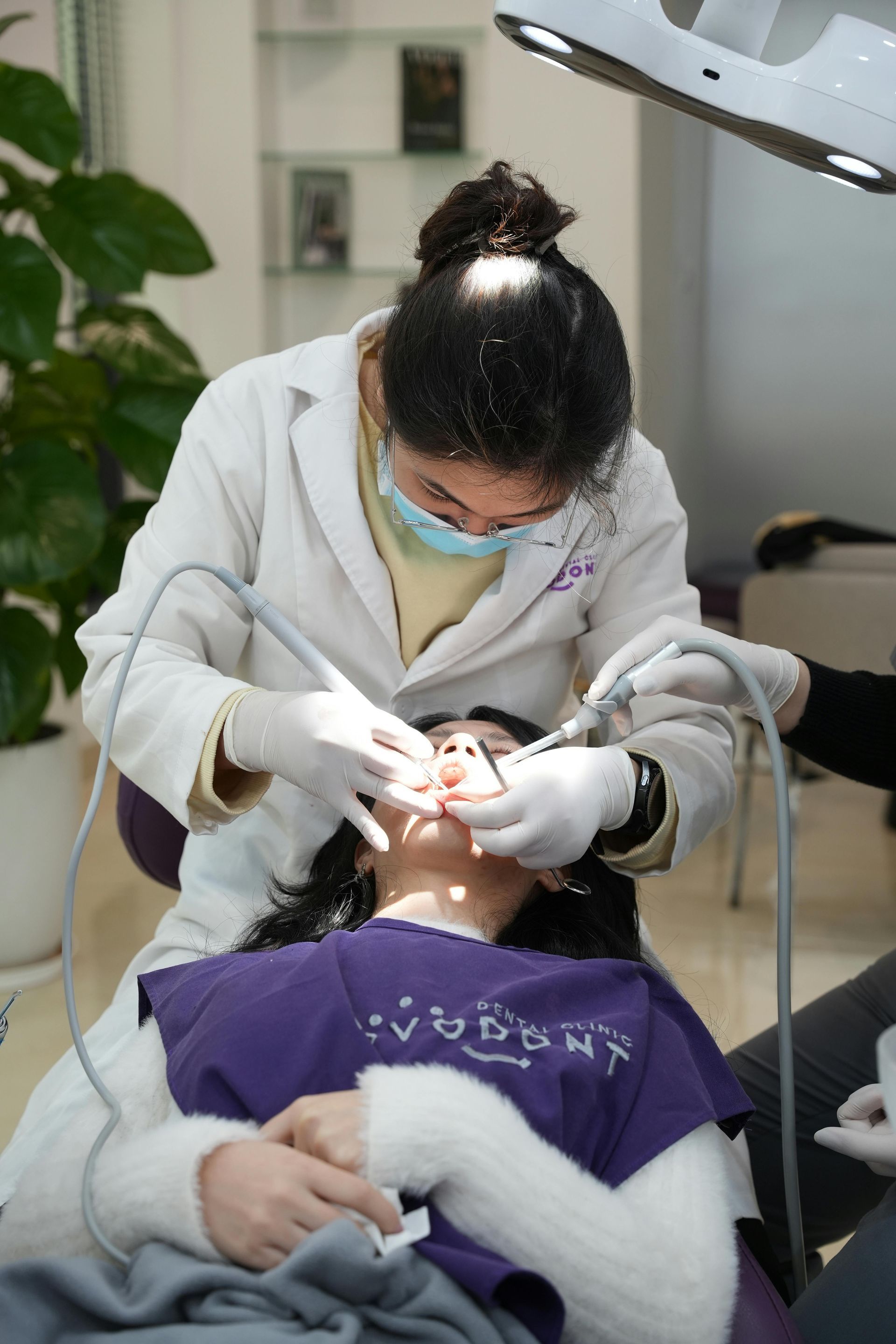
Our Blog

A Full Service Dentist
Centrally Located

by Evolve Dental Studio
•
26 February 2026
When tooth pain flares or swelling appears, it can feel overwhelming. You want relief, you want answers, and you want to protect your health. At Evolve Dental Studio in North Delta, we meet you in that moment with calm, clear guidance and pain-minimized care. Our philosophy is conservative and patient-centered. We aim to save your natural tooth whenever it is clinically reasonable, explain all options side by side, and support the choice that best fits your health, comfort, and goals. If you are wondering whether you need a root canal or an extraction, this guide walks you through how we assess infections, how we control pain, and what happens during a same-day emergency visit. How to recognize a tooth infection A tooth infection typically starts in the pulp, the soft tissue inside the tooth, or in the surrounding bone and gums. Common signs include: Throbbing or lingering pain, especially after hot or cold Sensitivity to biting or chewing Swelling of the gums or face, a pimple on the gum, or a bad taste Darkening of the tooth or tenderness to touch Fever, feeling unwell, or difficulty opening your mouth Call us urgently if you notice spreading swelling, fever, or trouble breathing or swallowing. These are red flags that require prompt attention. Same-day emergency appointments and walk-ins are available at Evolve Dental Studio, and our team will guide you on immediate steps while you are on your way. Why timely care matters Tooth infections rarely improve on their own. Early care can: Reduce pain and swelling faster Prevent the spread of infection to the jaw or face Increase the chances of saving your natural tooth Minimize the need for more complex treatment later Our goal is to give you fast relief and a plan that preserves as much natural tooth structure as possible. What to expect at your emergency visit You will be welcomed, assessed, and kept comfortable. We begin with a focused exam and digital X-rays to identify the source of pain. We may perform gentle tests, like cold testing or tapping the tooth, to understand nerve response. Where appropriate, we use a 3D scanner to visualize your bite and supporting structures. Pain control is immediate. We use precise local anesthesia, often delivered with The Wand computer-controlled system for a gentler experience and reduced collateral numbness. If anxiety is a barrier, we discuss sedation options, from nitrous oxide to oral sedation, in line with your medical history and preferences. Learn more about our approach to comfort in our overview of dentistry with sedation at Evolve Dental Studio in Surrey, BC. If an infection is confirmed, we will explain your options clearly, including likely timelines, steps, and aftercare. Same-day care typically includes starting root canal treatment to remove infected tissue and calm the tooth, or extracting the tooth if it is not restorable or you choose removal. We also manage drainage when needed to relieve pressure. For urgent situations, visit our page on what to do in a dental emergency to see how we triage and treat same-day. Root canal vs extraction, how we help you choose We consider three questions: Can the tooth be predictably saved, will it function comfortably, and does saving it align with your goals and budget? Root canal treatment is usually the first choice for a restorable tooth with an infected pulp. We disinfect and seal the canals, then protect the tooth with a custom restoration. Many back teeth benefit from a crown afterward for strength and longevity. Explore our page on root canal treatment for a step-by-step look at the procedure and recovery, and our guidance on placing dental crowns on teeth. Extraction is recommended when a tooth is cracked below the gumline, has insufficient structure to hold a restoration, or presents a poor long-term prognosis. If removal is chosen, we discuss replacement options early to prevent shifting of neighbouring teeth and to maintain chewing function. Depending on your situation, a bridge in dentistry may be appropriate. You can r ead more about dental bridges at Evolve Dental Studio and how we plan shade, fit, and bite with a conservative lens. Our team is transparent about pros, cons, costs, and maintenance. We support your decision without pressure. What antibiotics can and cannot do Antibiotics can help control the spread of infection and reduce systemic symptoms like fever or facial swelling. They do not remove the source of infection inside the tooth. Without root canal therapy or extraction, symptoms often return because bacteria remain in the pulp or surrounding bone. We prescribe antibiotics only when clinically indicated. Overuse can lead to side effects and resistance. If you are pregnant, immunocompromised, or on other medications, we will tailor recommendations for safety and coordinate with your physician when needed. About “natural antibiotics”: there is no reliable natural remedy that can cure a tooth infection. Saltwater rinses and cold compresses may ease discomfort temporarily, but they cannot eliminate bacteria inside the tooth. Clove oil can numb the area briefly but does not treat the cause. The definitive fix is professional care to remove the infection source. Will the ER or a dentist pull an infected tooth the same day? Emergency rooms can provide pain medication and antibiotics, and they will rule out life-threatening complications. Most ERs do not perform dental extractions. They will usually advise you to see a dentist as soon as possible. At Evolve Dental Studio, we provide same-day emergency assessment and, when appropriate, same-day treatment. If a tooth is infected and non-restorable, we can often perform a same-day extraction after careful imaging and consent. If saving the tooth is viable, we typically begin root canal infection treatment the same day to relieve pain and stabilize the area, then complete the procedure in a follow-up visit. Pain control and sedation options Comfort is central to our care. We use: Gentle local anesthesia, often delivered with The Wand for precise numbing Nitrous oxide for minimal, fast-recovery relaxation Oral or IV sedation for moderate support when clinically appropriate Behavioural strategies and clear, step-by-step explanations to reduce anxiety We review your medical history, recent meals, and transportation needs to choose a safe plan. After sedation, you will receive detailed recovery instructions and a follow-up call. Aftercare, timelines, and returning to normal Root canal aftercare typically includes one to three days of mild soreness managed with over-the-counter medication, soft foods, and avoiding chewing on the treated side until the final restoration is placed. Many patients return to work or school the same day or the next day. Extraction aftercare focuses on protecting the blood clot. You will bite on gauze, avoid vigorous rinsing and straws for 24 hours, and follow a soft diet. Swelling can peak at 48 to 72 hours, then improve. Most patients resume normal non-strenuous activities the next day, with a gradual return to the gym after several days as advised. We schedule follow-ups to ensure healing is on track. If you experience worsening pain, spreading swelling, fever, or persistent bleeding, contact us immediately. Short FAQ How do I know if a tooth is infected? Look for throbbing pain, sensitivity to bite or temperature, swelling, gum pimples, bad taste, darkening of the tooth, or fever. Seek urgent care if you have facial swelling, fever, or trouble swallowing. What is the strongest natural antibiotic for a tooth infection? There is no proven natural antibiotic that can cure a tooth infection. Only professional treatment, such as root canal therapy or extraction, removes the cause. Will the ER pull a tooth if it is infected? Typically no. ERs provide pain control and antibiotics, then refer you to a dentist. Will a dentist pull an infected tooth the same day? Often yes, if the tooth cannot be saved and imaging shows it is safe to remove. Otherwise, we prioritize same-day steps to relieve pain and start definitive care. What will a dentist do in an emergency? We examine, take X-rays, control pain, explain options, and begin definitive treatment the same day when feasible. We also provide clear aftercare and follow-up. Why choose Evolve Dental Studio for urgent tooth infections We are a modern, welcoming dental clinic in North Delta focused on conservative, patient-centered care. We use up-to-date technology, including digital imaging, a 3D scanner, and The Wand for gentle anesthesia. We accept same-day emergencies, offer direct insurance billing, and coordinate with the Canada Dental Care Plan when applicable. Most importantly, we listen, educate, and collaborate so you feel informed and in control. If you are in pain, call us today at 778-438-2160. For urgent guidance and to request a same-day visit, see our information on our dental emergency care. To understand how we save teeth comfortably and predictably, explore our page on root canal treatment , then ask us anything. You are in good hands, and we will help you choose the path that protects your health and preserves your smile whenever possible.

by Evolve Dental Studio
•
6 January 2026
Tooth pain anytime is tough and all you want it instant relief. You are not alone. At Evolve Dental Studio in North Delta and Surrey, we see many dental emergencies and we are here to help you feel better today with simple, safe steps you can do at home, plus clear guidance on when to call us for same‑day care. First, breathe: quick relief you can try right now Rinse gently with warm saltwater. Mix 1/2 teaspoon of salt in a cup of warm water, swish for 30 seconds, spit, and repeat a few times a day. This calms irritated gums and may reduce inflammation. Use a cold compress on your cheek for 10 to 15 minutes at a time. Rest, remove for 10 minutes, then repeat as needed. Cold helps reduce swelling and numbs pain. Take over‑the‑counter pain relief as directed. Acetaminophen or ibuprofen can be effective. If you have a medical condition, allergies, or you take blood thinners, speak with a pharmacist first. Keep the area clean. Gently brush and floss to remove trapped food. Sometimes, relief comes from clearing a seed or husk that is pressing on the gum. What to avoid: Do not put aspirin on your gums or tooth. It can burn the tissue. Do not apply heat to a swelling. Warmth can spread infection and increase inflammation. Avoid very sweet, sticky, or extremely cold foods that can trigger sensitivity. Skip hard chewing on the painful side to prevent cracks or further damage. When the pain feels unbearable Unbearable pain suggests a deeper problem, such as a crack, abscess, or advanced decay. While the steps above can ease symptoms, they cannot treat the cause. If pain wakes you at night, lingers more than a day or two, or spikes with hot or cold, call us. We hold same‑day emergency slots through the day. Walk‑ins are welcome, and we can usually see you quickly. You can reach Evolve Dental Studio at 778‑438‑2160 or info@evolvedentalstudio.ca . We focus on conservative, pain‑minimized care. Local anesthesia is provided with gentle techniques, and sedation options are available when appropriate. Our priority is to get you comfortable and provide clear, no‑pressure choices. Lost filling or crown, temporary fixes that are safe If a filling falls out: Keep the area clean. You can place a small amount of temporary dental material from a pharmacy into the cavity. Do not use household glues. Eat soft foods and avoid chewing on that side. If a crown comes off: Clean the inside of the crown and the tooth gently. If it fits back on easily and feels stable, you can use temporary dental cement to hold it in place until we see you. If it does not seat fully, keep it safe in a container and do not force it. A high crown can damage the bite or crack the tooth. If a temporary crown comes loose: Re‑cement with temporary dental material or leave it off, keep the area clean, and call us for a quick recementing visit. These are stop‑gaps. Definitive care matters to protect your tooth structure and prevent infection. If you need longer‑term protection after a fracture or root canal, we can discuss options like dental crowns north delta in a clear, budget‑aware way. How to stop tooth pain when you cannot afford a dentist We understand cost concerns. Here are practical steps: Start with the at‑home measures above to calm tissues. Call us for guidance. We provide direct insurance billing and can check benefits for you. If you qualify for the Canada Dental Care Plan, our team helps you understand canadian dental care plan coverage and how to use it. Ask about staging care. Often, we can prioritize urgent pain relief first, then plan definitive treatment later. We explain all options and costs up front, with no pressure. Consider community resources. Some patients have access to employer health spending accounts or provincial programs. Our front desk can help you explore what applies to you. Pain is a medical issue. Early, conservative treatment often costs less than delayed care. Cold vs. warm compresses, what actually helps Use cold for pain and swelling on the cheek. It slows inflammation and numbs the area. Use warm saltwater rinses inside your mouth for sore gums or minor irritation. Avoid direct heat if there is any visible swelling, fever, or a tooth that is tender to touch. Heat can worsen an infection. How to know if a tooth is infected Signs include: Throbbing pain that does not settle, especially at night Swelling in the gums or face, a pimple on the gum that drains, or a bad taste Pain to biting or persistent sensitivity to heat Fever, fatigue, or generally feeling unwell Difficulty opening your mouth or swallowing These are red flags. If you notice facial swelling, fever, or trouble breathing or swallowing, seek urgent care right away. Call us for a same‑day dental emergency visit so we can drain infection, prescribe antibiotics when needed, and treat the source. What to do tonight if you suspect infection Keep your head elevated to reduce pressure. Use cold compresses and take pain relief as recommended. Do not press on the swelling or apply heat. Call us as early as possible. Many infections require root canal treatment to save the tooth, or occasionally an extraction. We will guide you to the most conservative option that addresses the cause. If you are researching, our overview of root canal treatment explains how disinfecting the tooth relieves pain and preserves your natural tooth when possible. Will an emergency dentist pull a tooth, and can it be the same day Our approach is to save your natural tooth when it is predictable and in your best interest. If the tooth can be saved, we may recommend root canal infection treatment with appropriate pain control, followed by a protective restoration. If the tooth is not restorable, or if you choose removal, we can often perform tooth extractions north delta the same day, conditions and medical history permitting. We explain risks and benefits, and we only proceed when you feel fully informed and comfortable. Eating and cleaning while you wait to be seen Choose soft, lukewarm foods such as yogurt, eggs, oatmeal, soups that are not hot, and smoothies. Avoid chewing on the sore side. Continue gentle brushing and flossing. Cleanliness reduces bacterial load and can lower pain. Stay hydrated. A dry mouth can increase sensitivity. Reassurance for anxious patients Dental pain can be emotional. Many people worry about injections or the unknown. We use The Wand computer‑controlled anesthesia for precise, gentle numbing. If you are very anxious, ask us about sedation dentistry surrey bc. Our team talks you through each step, checks in often, and never pressures you into treatment you do not want. Same‑day help at Evolve Dental Studio If you are in Surrey, North Delta, or Metro Vancouver, we are ready to help. Same‑day and Saturday appointments are held for emergencies, and walk‑ins are welcome. We offer direct insurance billing and assist with benefit checks, renewals, and the Canada Dental Care Plan. You will receive clear options, upfront costs, and follow‑up support. Call 778‑438‑2160 or email info@evolvedentalstudio.ca . You can also learn more about how we handle a dental emergency on our website. Summary: You can feel better today Use saltwater rinses, cold compresses, and appropriate pain relief. Avoid aspirin on gums and avoid heat on any swelling. Use temporary dental cement for lost fillings or crowns, and do not use household glues. Watch for infection signs, especially swelling or fever, and seek urgent care. Call us for same‑day help. We provide conservative, pain‑minimized care with direct insurance billing and options that respect your budget and preferences. We are here to listen, explain, and relieve your pain with minimal intervention and maximum care, so you can get back to your life with comfort and confidence.

by Evolve Dental Studio
•
19 November 2025
We are thrilled to announce a fantastic addition to the team at Evolve Dental Studio, one that significantly expands our ability to provide highly customized and exceptional oral care to the North Delta and Surrey communities. Please join us in warmly welcoming Philip, a talented and dedicated Denturist. Philip brings a passion for crafting smiles that not only function perfectly but also look completely natural. His approach is rooted in providing comprehensive, full-service denture care that is custom-made for each patient. For Philip, the process is deeply personal. He takes the time to understand each patient's unique needs and concerns, ensuring every detail is considered. This meticulous approach involves evaluating factors like age, skin tone, and facial contours to ensure the dentures he creates look and feel seamlessly natural. His goal is to provide a solution that restores confidence and comfort without compromise. The arrival of a practitioner with such a personalized focus is a perfect fit for the Evolve Dental Studio mission. “Adding Philip to our team is a significant step in our commitment to personalized care. His dedication to crafting dentures that are truly custom-made—considering not just function, but also aesthetics like skin tone and facial contours—perfectly aligns with our philosophy of achieving optimal, natural results for every patient,” says Dr. Agarwal. When Philip isn't focusing on helping patients achieve their best smile, he enjoys a healthy and active lifestyle. In his spare time, you can find him exercising, gardening, and spending time outdoors. Philip is happy to help, and if you are looking for high-quality, custom-made dentures in North Delta or Dentures Surrey, he is looking forward to taking great care of your smile. We encourage you to reach out to our team to learn more about the full scope of services Philip provides! Welcome to the team, Philip!

by Evolve Dental Studio
•
13 November 2025
A healthy smile is a lifelong investment, and caring for it looks a little different at every stage of life. From a child’s first tooth to a senior’s daily routine, maintaining good oral health requires consistent care, the right techniques, and regular dental visits. At Evolve Dental Studio, we believe that education and prevention are the foundations of long-term oral wellness. As a trusted North Delta dental clinic , our goal is to help families of all ages protect their smiles through every chapter of life. Dental Care for Children Good oral habits start young. As soon as a child’s first tooth appears, gentle brushing with a soft-bristled toothbrush and fluoride toothpaste should begin. Early visits to a family dental clinic help children become comfortable with the dental environment and establish positive experiences that reduce anxiety later on. Children are prone to cavities because of their love for sweet snacks and drinks, so supervision during brushing and flossing is essential. Parents should encourage brushing twice a day and flossing once a day, ensuring those habits become second nature. A balanced diet also plays a big role in oral health. Foods rich in calcium and low in sugar help strengthen developing teeth and gums. Regular dental check-ups every six months allow your dentist to monitor growth, apply sealants, and offer fluoride treatments to protect enamel. Most importantly, make oral care fun. Colourful toothbrushes, flavoured toothpaste, and reward charts can motivate children to stay consistent with their routines. Dental Care for Adults As we grow older, our lifestyle, diet, and stress levels all begin to impact our oral health. Adults are more likely to experience gum disease, tooth sensitivity, and enamel wear. Prioritising preventive care can reduce the need for more complex treatments down the road. Daily brushing and flossing are non-negotiable, but adults should also pay attention to signs of trouble—such as bleeding gums, bad breath, or sensitivity. These may indicate early gum disease or decay. Regular professional cleanings by a dental hygienist help remove plaque buildup that home brushing can’t reach, keeping your gums healthy and breath fresh. Stress management is another key factor. Grinding or clenching teeth, known as bruxism, can cause jaw pain and tooth damage. If you notice soreness in your jaw or frequent headaches, your dentist can recommend a custom nightguard to prevent further wear. Lifestyle choices also make a difference. Limiting alcohol, avoiding tobacco, and maintaining a balanced diet all contribute to better oral health. And don’t forget hydration—drinking plenty of water helps wash away bacteria and keep your mouth moist, reducing the risk of decay. For adults with busy schedules, it’s tempting to delay dental appointments, but regular visits every six months ensure that minor issues don’t develop into major problems. Prevention is always easier, faster, and less costly than treatment. Dental Care for Seniors As we age, oral health needs evolve once again. Seniors face challenges such as dry mouth, tooth loss, and gum recession. Medications can also impact saliva production, increasing the risk of cavities and discomfort. Daily oral hygiene remains crucial. Brushing twice a day with fluoride toothpaste and cleaning between teeth helps protect both natural and replacement teeth. For those with dentures, cleaning them daily and removing them at night prevents irritation and infection. Gum health is especially important for seniors. Receding gums can expose the roots of teeth, making them more sensitive and prone to decay. Regular dental check-ups allow your dentist to monitor these changes and recommend appropriate treatments or adjustments to dentures or implants. If arthritis or mobility issues make brushing difficult, using an electric toothbrush or adaptive handle can make a big difference. Staying hydrated and chewing sugar-free gum can also help stimulate saliva and combat dry mouth. A Lifelong Partnership in Oral Health At Evolve Dental Studio, we see dental care as a lifelong journey. Whether it’s your child’s first visit, a routine cleaning, or specialized care for an aging family member, we’re here to support every smile with compassion and expertise. Our team combines modern technology with a patient-centred approach, ensuring that each person receives care tailored to their unique needs. We understand that every stage of life presents its own challenges, but with consistent care and regular visits, a healthy smile can last well into your golden years.

by Evolve Dental Studio
•
20 October 2025
Who Qualifies for the Canadian Dental Care Plan? Evolve Dental Studio is committed to helping our patients access the care they need to maintain a healthy smile. The Canadian Dental Care Plan (CDCP) is a significant step towards making oral health services more accessible for many Canadians. What is the Canadian Dental Care Plan? The Canadian Dental Care Plan is a federal government program designed to help ease financial barriers to oral health care for Canadian residents who do not have access to private dental insurance and have an adjusted family net income of less than $90,000. It's important to note that the CDCP is a government benefit, not a replacement for private insurance. The Four Key Eligibility Requirements To qualify for the Canadian Dental Care Plan, you must meet all four of the following criteria: No Access to Dental Insurance: This is a crucial point. You are not eligible for the CDCP if you have access to any form of dental insurance, whether it's through your employer, a family member's employer, a professional or student organization, or a plan you purchased privately. This holds true even if you choose not to use or pay for that private coverage. However, if you have coverage through a government social program (provincial, territorial, or federal), you may still qualify. Adjusted Family Net Income is Less Than $90,000: Your eligibility is based on your adjusted family net income from the previous year, as assessed by the Canada Revenue Agency (CRA). The percentage of your dental costs that will be covered depends on where your income falls within this range: Under $70,000: 100% of eligible costs are covered at the CDCP established fees. $70,000 to $79,999: 60% of eligible costs are covered. $80,000 to $89,999: 40% of eligible costs are covered. Canadian Resident for Tax Purposes: You must be a resident of Canada for tax purposes to be eligible for the plan. Filed Your Tax Return in the Previous Year: You (and your spouse or common-law partner, if applicable) must have filed your income tax returns for the previous year so that the government can assess your family's income. Application and Enrollment The government has send out letters to those who may be eligible, inviting them to apply. If you meet the criteria and have not received a letter, you can still apply online through the official government portal once applications are open for your age group. You can apply here . Remember, your coverage start date will be provided in a welcome package from the plan administrator, Sun Life. You must wait until this date to receive covered services. Services Covered by the CDCP The CDCP is designed to cover a range of essential oral health services, including but not limited to: Dental exams and cleanings X-rays Fillings Root canals and extractions Complete and partial removable dentures For some services, preauthorization may be required to ensure coverage. We're Here to Help Navigating a new program can be confusing, but at Evolve Dental Studio, we are committed to making it as easy as possible for our patients. If you have questions about the Canadian Dental Care Plan or would like to book an appointment to discuss your dental needs, please contact our office. We can help you understand your benefits and plan your next visit.

by Evolve Dental Studio
•
17 July 2025
If you've been told you need root canal treatment, one of the first questions that often comes to mind is: How long does a root canal take? This standard dental procedure is essential for addressing severe tooth decay or infection; however, patients often want to know what to expect in terms of appointment length and overall treatment duration. In this article, we will examine the typical timeline associated with root canal treatment and offer insights into the root canal infection treatment process. What Is Root Canal Treatment? Before diving into the time required for a root canal, it’s helpful to understand what root canal treatment (also known as endodontic therapy) entails. When a tooth becomes infected due to decay, trauma, or cracks, the pulp inside the tooth — which contains nerves and blood vessels — becomes inflamed or infected. If left untreated, a root canal infection can lead to pain, abscesses, and ultimately, tooth loss. Root canal treatment involves carefully removing the infected pulp and cleaning the inside of the tooth’s root canals. After washing, the canals are shaped, disinfected, and filled with a biocompatible material to prevent further infection. The tooth is then sealed and usually restored with a crown for added strength. How Long Does a Root Canal Take? Typical Appointment Lengths The length of root canal treatment can vary based on factors such as the tooth’s location, the severity of infection, and the specific dental practice. Generally, a single root canal appointment lasts between 60 and 90 minutes. Single-Visit Root Canal Treatment In many cases, root canal treatment can be completed in a single visit. This is especially true for uncomplicated cases involving front teeth with only one or two root canals. Your dentist or endodontist will: Administer local anesthesia to numb the area Remove the infected pulp Clean and shape the canals Fill and seal the root canals Place a temporary filling or permanent restoration Single-visit root canal treatment is a convenient option that reduces the total number of dental visits. Multiple-Visit Root Canal Treatment However, in cases where the infection is severe or the tooth has multiple roots and a complex anatomy (such as molars), the treatment may require two or more visits. During the first appointment, the dentist removes the infected pulp and places medication inside the canals to address the infection. A temporary filling seals the tooth until the next visit, when the canals are thoroughly cleaned, sealed, and the restoration is placed. Multiple visits allow the dentist to monitor the healing process and ensure that the infection is completely cleared before the final filling. Additional Time Considerations in Root Canal Infection Treatment When it comes to root canal infection treatment specifically, the timeline can be affected by the extent of the infection. If an abscess or significant swelling is present, your dentist may prescribe antibiotics before or after the root canal procedure. In some cases, additional time may be needed to manage infection symptoms before proceeding with complete treatment. Recovery time also varies. While the procedure itself typically takes 60 to 90 minutes or is completed in two appointments, mild discomfort or sensitivity can persist for a few days following treatment. Factors That Influence the Duration of Root Canal Treatment Several factors will determine exactly how long a root canal takes in your case: Tooth location: Molars with multiple roots require more time than single-rooted incisors or canines. Complexity of root canals: Curved or narrow canals can extend treatment time. Severity of infection: Heavily infected teeth may need more comprehensive cleaning and multiple visits. Dentist’s experience and equipment: Specialists (endodontists) often use advanced tools that can speed up the process. Need for restoration: Placing a permanent crown may require separate appointments beyond the root canal procedure. What To Expect After Root Canal Treatment After root canal treatment, keeping the area clean and following your dentist’s instructions is crucial for a successful healing process. Mild soreness is common and typically managed with over-the-counter pain relievers. Full recovery and return to normal function usually occur within a few days. If you experience persistent pain, swelling, or signs of infection after treatment, contact your dentist promptly, as further care may be needed. Final Thoughts Understanding how long a root canal procedure takes can help alleviate anxiety about this necessary dental treatment. Typically, a root canal treatment appointment lasts between 1 and 1.5 hours, and complex cases may require two or more visits to complete. Root canal infection treatment is highly effective at saving infected teeth and preventing further complications when done promptly. If you suspect you need root canal treatment, don’t delay consultation with your dentist. Early intervention can reduce both the duration and complexity of the procedure. With proper care, a root canal-treated tooth can function well for many years, protecting your oral health and smile.
